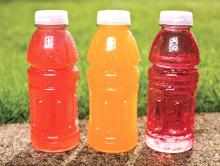Although daily consumption of sports drinks decreased from 2010 to 2015 among teenagers, sugar-sweetened sports drinks still are popular, with numerous high school students drinking them at least weekly, said Kyla Cordery of the Steven and Alexandra Cohen Children’s Medical Center of New York, Lake Success, N.Y., and her associates.
The researchers evaluated sports drink consumption by 11,305 U.S high school students in the 2015 Youth Risk Behavior Survey and 11,113 students in the 2010 National Youth Physical Activity and Nutrition Survey. Teenagers drinking one or more sports drinks daily dropped from 16% in 2010 to 14% in 2015, a significant change (P less than .0001). Comparisons of daily sports drink consumption revealed reductions for all age groups, sexes, race, and/or ethnicity categories, and for all levels of physical activity. The greatest reductions were for non-Hispanic blacks and for overweight children.Yet sports drink consumption in the previous week increased from 58% in 2010 to 60% in 2015 (P = .0002). And daily consumption of sports drinks also increased among teenagers watching television for more than 2 hours per day and among obese teens.
Boys were more than twice as likely as girls to drink one of more sports drinks daily (19% vs. 9%), as were more athletic/active children than those weren’t very athletic/active (18% vs. 10%).
“ Like many sugar-sweetened beverages, the excessive consumption of sports drinks is associated with weight gain, dental erosion, obesity, poor nutrition, and diabetes,” Ms. Cordery and her associates wrote. “The America Academy of Pediatrics’ Committee on Nutrition and Council on Sports Medicine and Fitness stated that the level of physical activity of the average child does not require the electrolyte replenishment offered by sports drinks.” Rehydration with water should be encouraged for most sports-related activities.
SOURCE: Cordery K et al. doi: 10.1542/peds.2017-2784.


